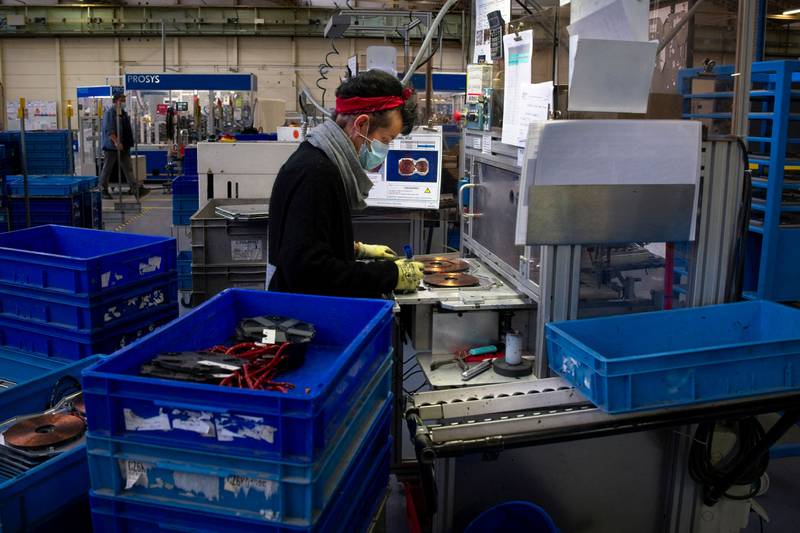GMIS 2021: Manufacturing sector requires more upskilling among its workforce

The manufacturing sector is lagging behind when it comes to upskilling its workforce, and more pressure is added by trying to impart skills given the accelerated pace of advancement in the industry.
The upskilling gap in the sector is higher compared to other industries because some jobs did not require or rely too much on technology. Now that we are in a new era disrupted by the coronavirus and a digital shift is under way, this could become a larger issue if not tackled quickly, according to Sayed Hashish, general manager of Microsoft UAE.
"Upskilling is definitely a challenge when it comes to comparing the scale of new skills that are needed within a very short time period. So, the challenge is: how can you upskill at an accelerated pace? The demand is so high and learning in general is a time-consuming exercise," Mr Hashish told The National on the sidelines of the Global Manufacturing and Industrialisation Summit (GMIS) in Dubai.
Upskilling – the process of individuals learning skills to expand their capabilities, along with reskilling – has become significant globally given the shifts in the business environment, specifically with the transition being witnessed as a result of digital transformation.
The benefits of upskilling are many, including higher productivity, talent attraction and retention, higher customer satisfaction, all allowing companies to take advantage of new technologies and instilling confidence in individuals to explore opportunities to grow their career.
From an economic standpoint, upskilling has the potential to contribute in a significant way, especially through greater private-public collaboration on a large scale. Initiatives on this front could boost global gross domestic product by $6.5 trillion and create 5.3 million net jobs by 2030, according to global consultancy PwC.
"This accelerated automation through artificial intelligence and machine learning to save precious workers’ time meant these individuals had to balance their focus on relying more on digital tools. But the underlining challenge that we are facing at the moment in manufacturing is the shortage of skills," Mr Hashish said.
"We are now seeing that this field needs more skilling and reskilling so workers can feel comfortable and properly understand how to use new technology in manufacturing to their benefit."
The use of AI, the Internet of Things, 5G and other new technologies creates greater opportunities for workers to re-learn and help streamline industries with the latest innovations, which, in turn, would boost productivity and economic contribution.
"We try to solve the challenge of how organisations can keep up with production while being cost-effective. These technologies are already under way or implemented in many organisations and industries. Today, we have connectivity capabilities that will transform manufacturing in a tremendous way, which is right around the corner," Mr Hashish said.
Last year, during the coronavirus pandemic, Microsoft launched a programme designed to help 25 million people worldwide acquire the digital skills needed in a Covid-19 economy.
Mixed reality to help businesses
Meanwhile, businesses across the UAE must invest in technologies, such as augmented and virtual reality, to stay ahead of the digital curve, said Maria Pace, technology leader in mixed reality at Microsoft HoloLens.
"As the world becomes increasingly digitised, immersive technology needs to be rapidly integrated into all platforms. By developing innovations, mixed reality can continue to cater to the need for businesses to strengthen operations worldwide," Ms Pace said at the GMIS.
Mixed reality is a blend of physical and digital worlds, unlocking natural and intuitive 3D human, computer and environment interactions. Examples are educational tools that help students to learn using interactive objects, mobile games such as Pokemon GO and simple holograms.
The global mixed reality market was valued at $258.69 million in 2018 and is expected to grow at a compound annual rate of 47.9 per cent through 2024, data provider MarketWatch estimates suggest. Mixed reality is gaining widespread recognition across business processes and the momentum is expected to grow further.
"We have clear examples how technologies have been beneficial for many sectors for safety and remote access. Investment will be key to enabling a breakthrough for the industry, and we believe it is important to conduct a good assessment for businesses. Sometimes it does take a whole restructuring to push companies in the right direction," Ms Pace said.
The HoloLens is Microsoft's mixed reality glasses that comes with enterprise-ready applications aimed at increasing user accuracy and output.
